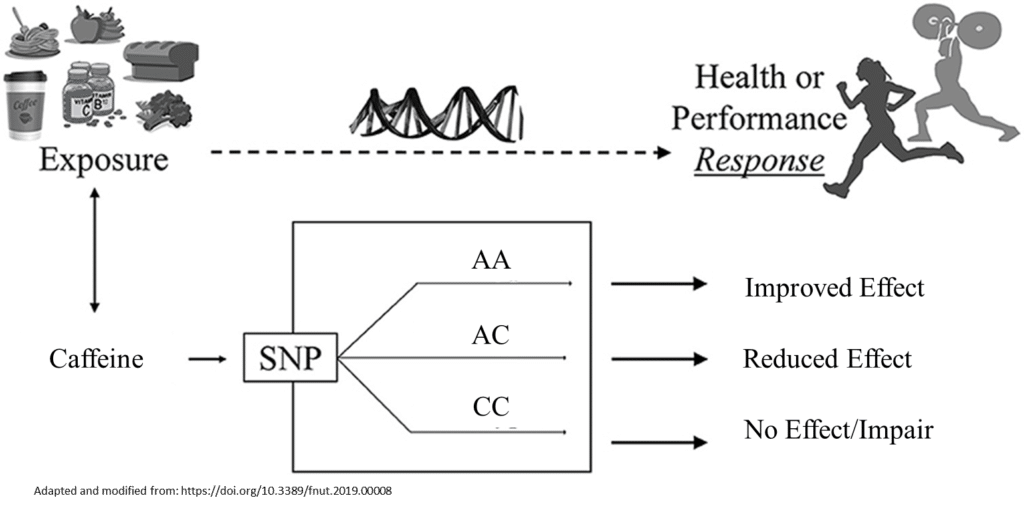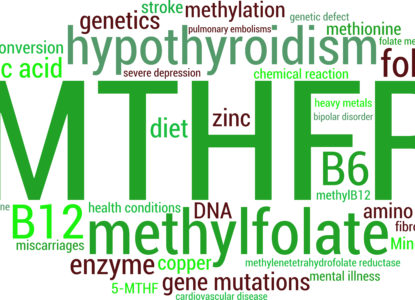Why Caffeine’s Impact on Athletic Performance Varies by Individual

Contents
Caffeine is a stimulant consumed by millions of people worldwide. With as widespread as caffeine use is, it’s no surprise that the athletic community has experimented with caffeine’s influence on athletic performance. In fact, after the World Anti-Doping Agency removed caffeine from its banned substances list, 3 out of 4 athletes surveyed were found to consume caffeine before a competition1.
Recent advances in research suggest that consuming caffeine may not be beneficial for all athletes because of differences in how some people metabolize caffeine. These differences have a genetic basis, and depending on the gene variant possessed, it may not produce the performance-enhancing effect that is hoped for.
How does caffeine work?
In the USA, adults ingest an average of 3 mg of caffeine per kilogram of body weight per day in the form of coffee, tea, and caffeinated sodas. Technically, caffeine is a psychoactive stimulant that is metabolized by our liver cells into three active compounds:
- Theophylline
- Theobromine
- Paraxanthine
These compounds then enter the bloodstream and influence vasodilation (increase blood flow), fat oxidation (produce energy), and reduce airway constriction in the lungs. In addition to this, caffeine that is not metabolized binds to and blocks adenosine receptors in the brain which prevents a person from feeling fatigued, but can also inhibit sleep 2.
This is significant because, during exercise, adenosine concentrations increase rapidly which results in increased feelings of fatigue. This result is reduced or prevented if caffeine is present in the bloodstream.
This effect, plus an energy boost, together with the opening up of airways and improved concentration, is the reason why caffeine is a ‘go-to’ stimulant for elite athletes. These effects on athletes are so pronounced that some level of regulation of the stimulant during competitive events has been enforced in the past.
What effect does caffeine have on athletic performance?
Caffeine studies involving endurance exercise have shown improvements in work output and significant extensions in time to exhaustion 3. The effect of caffeine increases along with the increasing duration of the time trial event, so endurance athletes may especially benefit from the use of caffeine as a stimulant 4.
Cycling
In one study which looked at the effects of caffeine on high-intensity time trial cycling performance in trained subjects, it was found that a moderate dose of caffeine (6 mg/kg) resulted in the cyclists riding significantly farther when compared to the placebo controls. Their performance was also improved by 4-5 % when compared to the other two treatments used 5.
Muscular strength
A randomized, double-blind, cross-over study looked at the acute effects of caffeine on muscular strength and power, muscular endurance, and rate of perceived exertion, in resistance-trained men6. They found that 6 mg/kilogram of caffeine pre-training significantly improved lower-body strength, and therefore power when compared to the placebo group6.
These findings were mirrored by a study looking at maximal strength and strength-endurance in women who were given 6 mg/kg of caffeine pre-training. This acute dose significantly improved maximum strength7, although it had no ergogenic (increase in physical performance) effects.
Although hundreds of studies documenting the effects of caffeine on athletic performance have been published, a lack of consistency in the results of many of the measured performance parameters has been noted.
This lack of consistency was put down to differences in how caffeine is metabolized between individuals, which is strongly associated with our genetic make-up.
The CYP1A2 genotype determines caffeine performance-enhancing effects
The CYP1A2 gene determines the rate of caffeine metabolism between individuals, that is, how quickly or slowly caffeine is metabolized. The quicker it is metabolized, the better the performance of the athlete will be.
Research has found that a single nucleotide polymorphism (SNP) in the CYP1A2 gene alters the CYP1A2 enzyme function. Three genotypes can occur:
- The AA genotype – fast metabolizers
- The AC genotype – slow metabolizers
- The CC genotype – ultra-slow metabolizers

Cycling
A study published in Medicine and Science and Sports and Exercise looked at whether these variations in the CYP1A2 gene modifies the performance-enhancing effects of 0, 2, or 4 mg of caffeine per kilogram of caffeine in a 10-km cycling time trial 8.
The study found that:
- Individuals with the AA genotype were able to cycle faster. They decreased their cycling time by 4.8% after 2 mg/kg caffeine, and 6.8% after 4 mg/kg caffeine for a significant beneficial effect.
- Individuals with the CC genotype saw performance drop! Their cycling time increased by 13.7% after 4 mg/kg caffeine.
- No effects were observed among those with the AC genotype.
Muscle strength
A 2021 study published in the International Journal of Sport Nutrition and Exercise Metabolism assessed whether the CYP1A2 genotype affected muscle strength in competitive male athletes after 2 or 4 mg/kg of caffeine consumption before the event9.
In this study, the vertical jump was used as an indicator of lower body power production, and the handgrip test was used as a surrogate measure of overall body strength.
The study’s main findings were as follows:
- Individuals with the slow metabolizing CC genotype experienced a 12.8% decrease in handgrip strength after 4 mg/kg of caffeine compared with placebo.
- No differences were observed in handgrip strength for those with the faster AC or AA genotypes
- No differences were observed in the vertical jump in any of the genotypes.
The authors conclude that athletes should consider their CYP1A2 genotype before using caffeine to improve muscle strength, since it may actually impair muscle strength during an exercise event in slow caffeine metabolizers.
Genetics are the driver of caffeine enhanced athletic performance
It’s clear that caffeine has a place in the world of sports, however, your CYP1A2 genotype should be determined, together with the correct timing of caffeine intake before the event, as well as the amount of caffeine to be consumed in order to experience the optimal performance-enhancing effects of caffeine.



